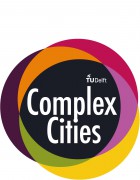Complex Cities assists graduation at the Department of Urbanism, Faculty of Architecture/Delft University of Technology. Graduations combine knowledge from the fields of planning and design for a built environment that is appreciated by many, in a democratic and open society.
Planning Complex Cities is a graduation studio at the Department of Urbanism, Faculty of Architecture and the Built Environment, Delft University of Technology. As other graduation studios at this department, it is set up to align graduation students’ research with the research programme of the department. The studio involves MSc Urbanism graduation students and researchers at the Spatial Planning & Strategy and the Urban Studies sections.

Planning Complex Cities graduations build upon the expertise in spatial development, spatial planning, territorial governance, and participation, present at the Department of Urbanism.
The basic starting points of graduation projects in this studio are observations of disparities and conflicts arising from the distribution of spatial resources across communities and territories. In a typical graduation trajectory, central propositions on the institutional causes and drivers of these spatial manifestations of inequity are formulated first. Those propositions may concern formal institutions embodied in e.g. legal and regulatory planning frameworks, policy delivery mechanisms, obligatory cooperation between governments, or formal distributions of power. Propositions may also concern informal institutions, e.g. the voluntary engagement and participation of communities and non-governmental organisations in planning processes, invisible power distributions, planning and governance cultures and traditions, or even ideologies. During Planning Complex Cities graduation projects, the interrelations between spatial and institutional circumstances are elaborated in depth. Conclusions from projects typically recommend institutional change and demonstrate how this can lead to new spatial development patterns, by means of design.
Planning Complex Cities graduation projects investigate planning schemes, governance arrangements, and civic engagement in regions and urban areas, how these influence the transformation of spatial structures and how they can be enhanced to achieve more sustainable spatial outcomes. This is done using an enlarged notion of design, conceptualised here as the design not only of physical structures or places, but also of processes, and organisations.
A more detailed scope of graduation projects stems from a focus on substantive issues (a particular interest in, for instance, energy transition, housing provision or economic transformation), normative values (a particular wish to improve, for instance, environmental sustainability, socio-spatial equity, economic competitiveness or democracy), and from placing graduation projects in particular focus areas (for a general, description of these, see below). A more detailed scope is also derived from positioning projects in a ‘playing field’ that is composed of the interaction between spatial development (and consequently planning and governance approaches) at different scales. Two Planning Complex Cities sub-themes form starting points for the elaboration of the multi-scalar nature of any intervention in spatial systems and therefore this this positioning.